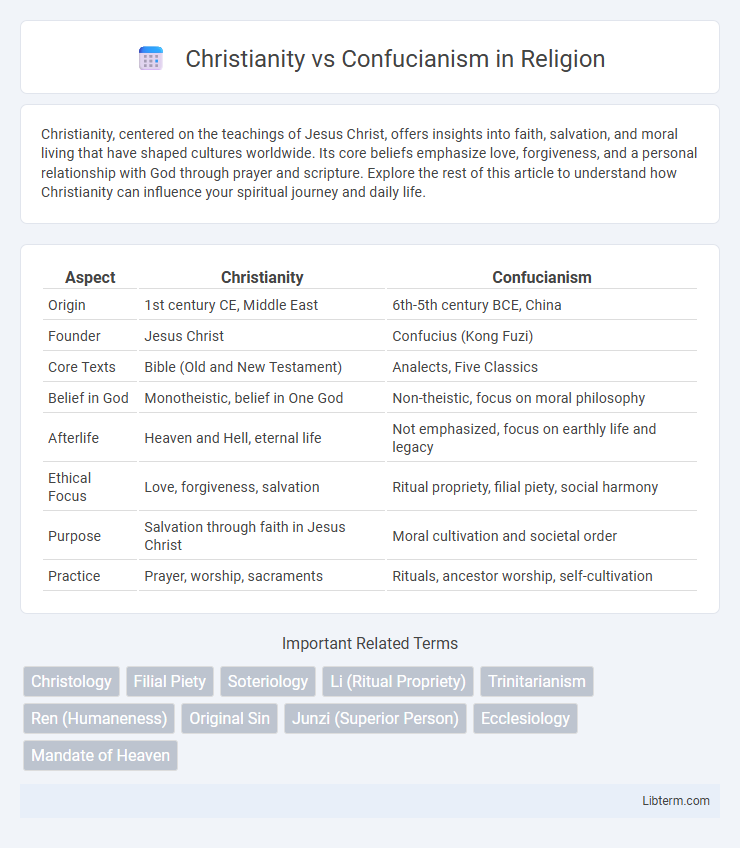Christianity, centered on the teachings of Jesus Christ, offers insights into faith, salvation, and moral living that have shaped cultures worldwide. Its core beliefs emphasize love, forgiveness, and a personal relationship with God through prayer and scripture. Explore the rest of this article to understand how Christianity can influence your spiritual journey and daily life.
Table of Comparison
| Aspect | Christianity | Confucianism |
|---|---|---|
| Origin | 1st century CE, Middle East | 6th-5th century BCE, China |
| Founder | Jesus Christ | Confucius (Kong Fuzi) |
| Core Texts | Bible (Old and New Testament) | Analects, Five Classics |
| Belief in God | Monotheistic, belief in One God | Non-theistic, focus on moral philosophy |
| Afterlife | Heaven and Hell, eternal life | Not emphasized, focus on earthly life and legacy |
| Ethical Focus | Love, forgiveness, salvation | Ritual propriety, filial piety, social harmony |
| Purpose | Salvation through faith in Jesus Christ | Moral cultivation and societal order |
| Practice | Prayer, worship, sacraments | Rituals, ancestor worship, self-cultivation |
Origins and Historical Development
Christianity originated in the 1st century CE in the Roman province of Judea, rooted in the teachings of Jesus Christ and the Hebrew Bible, with early expansion fueled by the Apostle Paul's missionary journeys. Confucianism emerged in 6th-century BCE China, based on the philosophies of Confucius, emphasizing moral principles, social harmony, and filial piety during the Eastern Zhou Dynasty. Christianity developed through the establishment of the Church and doctrinal councils, while Confucianism evolved as a guiding ethical system influencing Chinese governance and society for over two millennia.
Core Beliefs and Doctrines
Christianity centers on the belief in one God and the salvation of humanity through the life, death, and resurrection of Jesus Christ, emphasizing grace, faith, and the Bible as sacred scripture. Confucianism focuses on ethical principles, social harmony, and moral conduct, guided by key concepts such as Ren (benevolence), Li (ritual propriety), and Xiao (filial piety), with teachings primarily derived from Confucius' Analects. While Christianity addresses spiritual salvation and an afterlife, Confucianism prioritizes practical living and societal order without a distinct emphasis on the supernatural.
Concept of God and the Divine
Christianity centers on the belief in one omnipotent, omniscient God who is personal, transcendent, and actively involved in human affairs, with Jesus Christ as the divine Son and savior. Confucianism emphasizes an impersonal cosmic order called Tian (Heaven) that governs moral law and social harmony, without focusing on a personal deity or creator. The Christian concept of God involves worship, prayer, and divine grace, while Confucianism prioritizes ethical living and filial piety under Heaven's moral mandate.
Moral Values and Ethical Teachings
Christianity emphasizes moral values rooted in the teachings of Jesus Christ, highlighting love, forgiveness, and compassion as central ethical principles. Confucianism centers on virtues such as filial piety, righteousness, and social harmony, promoting ethical behavior through respect for hierarchy and community responsibilities. Both systems prioritize cultivating moral character but differ in the source of authority: divine commandments in Christianity versus human-centered wisdom in Confucianism.
Views on Humanity and Human Nature
Christianity teaches that human nature is inherently sinful due to the Fall, emphasizing redemption through faith in Jesus Christ and the importance of grace for salvation. Confucianism views human nature as fundamentally good and perfectible through self-cultivation, moral education, and adherence to societal roles and rituals. Both systems stress ethical behavior but diverge on the origins of human morality and the path to achieving virtue.
Rituals, Worship, and Religious Practices
Christianity centers rituals around sacraments like baptism and communion, emphasizing communal worship often held in churches with prayer, hymns, and sermons. Confucianism prioritizes ritual propriety (li) involving ancestor veneration, ceremonies honoring moral virtues, and social rituals that reinforce harmony and respect in daily life. While Christian practices focus on worshiping a deity through faith and divine grace, Confucian rituals cultivate ethical behavior and social order without invoking supernatural worship.
Social Structure and Community Life
Christianity emphasizes spiritual equality and the unity of all believers, promoting a community centered on love, compassion, and service, often transcending traditional social hierarchies. Confucianism prioritizes a well-defined social structure based on hierarchical relationships, such as ruler-subject and parent-child, fostering harmony through duty, respect, and proper conduct within family and society. While Christianity encourages a universal brotherhood under God, Confucianism strengthens social order by reinforcing established roles and reciprocal responsibilities.
Attitude Toward Government and Authority
Christianity emphasizes the divine authority of God, encouraging believers to respect governmental powers as instituted by God, yet it also promotes individual conscience and moral responsibility to challenge unjust rulers when civil laws conflict with divine commands. Confucianism upholds a hierarchical social order, stressing the importance of filial piety, loyalty, and harmony within society, advocating obedience to rulers who govern with virtue and benevolence while expecting rulers to lead by moral example. Both systems highlight the ethical relationship between individuals and authority, but Christianity centers on spiritual obedience tempered by moral judgment, whereas Confucianism prioritizes societal harmony and duty through proper conduct within hierarchical roles.
Influence on Culture and Society
Christianity profoundly shapes Western culture through its emphasis on individual salvation, moral ethics, and community worship, influencing art, law, and social institutions for centuries. Confucianism, central to East Asian societies, emphasizes social harmony, filial piety, and hierarchical relationships, deeply impacting family structures, education, and governance. Both systems serve as foundational frameworks for cultural identity and social order in their respective regions.
Modern Relevance and Global Impact
Christianity shapes global ethical frameworks and social values through its teachings on compassion and justice, influencing international human rights and charitable organizations. Confucianism's emphasis on harmony, filial piety, and social responsibility significantly affects East Asian political systems, business practices, and education models. Both belief systems contribute to contemporary debates on morality, governance, and community cohesion in an increasingly interconnected world.
Christianity Infographic

 libterm.com
libterm.com